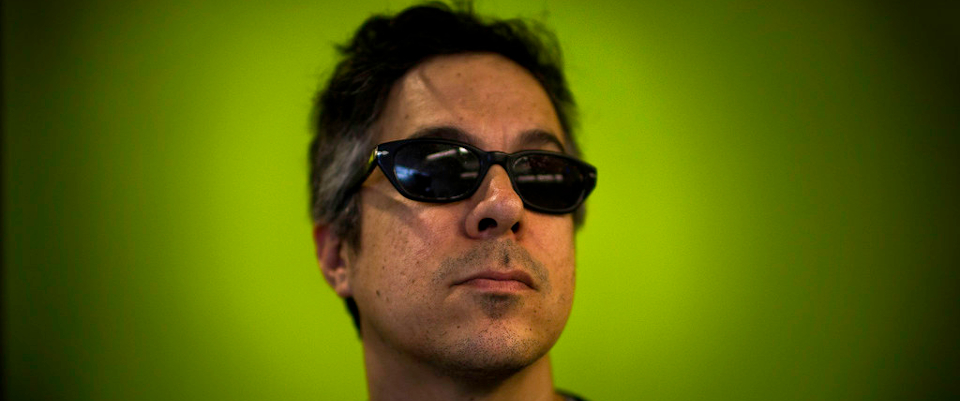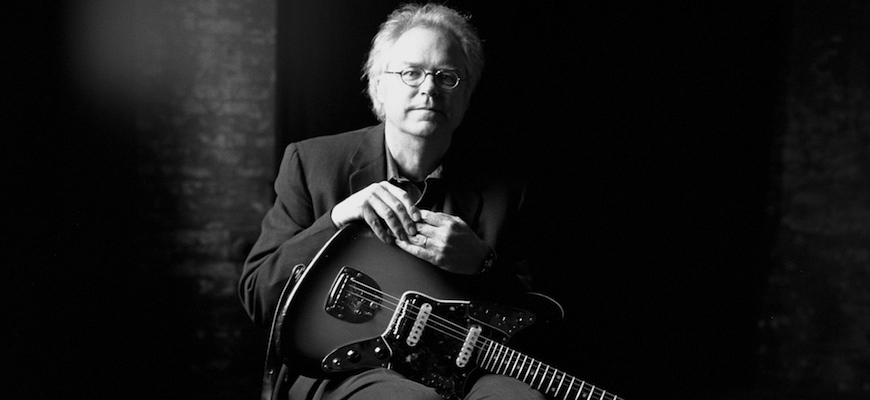Photo by Gabriel C. Pérez for KUTX
Migration Stories marks M. Ward‘s 10th studio album, released last week on Anti- Records. On April 8 at 1p, in place of his scheduled world tour with a six piece band, the singer/songwriter will perform the songs live, the way he originally wrote them, stripped down with just his voice and acoustic guitar.
M. Ward joins KUTX host Jody Denberg from his home in Glendale, California to talk album inspiration, his grandfather’s immigration and why he thanks Leonard Cohen in his album notes.
-Deidre Gott, Live Music Producer
Listen to Jody Denberg’s interview with M. Ward
Jody Denberg: It’s a real pleasure to chat with M. Ward. He just released his 10th studio album. It’s called Migration Stories. You know him from his own records, from his great series of releases with Zooey Deschanel as She and Him, as a member of Monsters of Folk, and is the luckiest man on earth because he has worked with the greatest women on the planet – Mavis Staples, Beth Orton, Neko Case, Norah Jones, Jenny Lewis.
The new album, Migration Stories, has such a great vibe. And I’m sure there’s a lot of things that contributed to this peaceful, hushed vibe. Would one of them be the fact that you recorded in Montreal?
M. Ward: Yes, definitely. I worked with some musicians I’d never worked with before, and their expertise with keyboard textures, synthesizer and mixing the old with the new in as far as these textures go, was really inspiring. We knew ahead of time that we wanted a lot of space on the record and not to fill it up with too many notes or words or licks or ideas. I feel really happy with the balance that we found.
Jody Denberg: You created this spaciousness, but at the same time, there’s strings, there’s perhaps more keyboards than on other records of yours, there’s these amazing backing vocals. So how did you create that spaciousness when you had all of these elements to juggle?
M. Ward: It’s a good question. So much of it is hard to measure. We are just constantly experimenting. And it’s – I guess a good analogy would be – nobody wants to watch a film about hundreds of characters. It’s much more interesting and emotional if you can follow the path of one individual or one lyrical idea and give it room to breathe. And that was what we tried to do in speaking obliquely.
Jody Denberg: Well, you achieved it.
Migration Stories, that’s a title that for me evokes several things – and maybe you don’t want to tie it down to a specific meaning – but where were one or two of the places you were coming from with the title Migration Stories?
M. Ward: Well, I was discovering my grandfather’s migration, which started in Mexico. He was born in 1900 and migrated to the USA via El Paso, Texas in the 1920s. I’ve always been curious about his passage, but especially curious over the last few years in what’s happening with the migration crisis in North America and the migration crisis in Europe. I’ve just been reading tons of articles about the situation. And, you know, I definitely don’t have any great grand political solutions to dealing with millions of people, but I have an emotional reaction when I read these stories about these specific individuals – how some of them might be living this modern version of what my grandfather went through.
There was a lot to be inspired by, there’s a lot to have anxiety for, there’s a lot of things to be fearful for, but with music – with my music – I try to find a hopeful place out of whatever bad news I’m reading or anxiety or fear that I’m feeling. I feel like music is good therapy for me in that way.
Jody Denberg: Amen, brother.
M. Ward in KUTX Studio 1A 3.7.2016
Jody Denberg: From the migration stories – which you just kind of told us a little bit about the background of the album title – to the song “Migration of Souls” – to me, that connotes something different than what you were just talking about – the immigration of citizens. How about for you, migration of souls?
M. Ward: Well, yeah, I think there’s a spiritual element to migration and that goes beyond life and death. I like the idea that there’s no force that can stop the reunification of generations on one level – if we are thinking outside of the body. I realize it’s an abstract thing to think about, but because I work with music and I’m not a politician, I feel the invitation is there to go into that place and illustrate it in whatever way I feel can mirror what I’m thinking about these subjects that are kind of hard to talk about.
Jody Denberg: Well, the good thing is everyone can listen to this album. I just did. I’ve been hearing songs – piecemeal – but now I just sat down and listened to the whole Migration Stories by M. Ward, and it’s such a healing record.
And I was reading just a few hours ago, you were talking with NPR Music, and I guess they were asking you about the music that was helping you during this difficult time of isolation. You mentioned that you were listening to McCoy Tyner, and that your favorite record of McCoy – who recently passed – was Ballads by John Coltrane. Now someone who’s listening to M. Ward and not getting beyond the vibe, might not have guessed that these are seminal influences for you.
M. Ward: John Coltrane’s and McCoy Tyner’s instinct of “less is more”, especially on this Ballads record is just like medicine to me. Whatever you’re going through – if you play this record – things seem to be right again. And there’s a lot of records I could’ve picked, but this is the one that I’ve been falling back on lately because you can play it a million times and still find something new inside of it.
And then I learned that they didn’t even rehearse for this record. These four guys just got together and created this masterpiece. And when you think about that, and you think about instincts and inspiration, what happened in these sessions, it’s you know, I listened to it for the rest of my life.
Jody Denberg: Well, thank you for the tip.
My go-to records have been In A Silent Way by Miles Davis and Brian Eno’s Music For Airports. So I think we’re on the same plane.
M. Ward: Yes. Yes!
Jody Denberg: Now I’m gonna go ahead and listen to Ballads by John Coltrane, as suggested by M. Ward, who we’re speaking with about his brand new album, Migration Stories.
Another influence for you – and I guess this is easy for me to say because there’s a couple of instrumental acoustic songs on the album – is John Fahey and what I call avant acoustic music. Tell me what John Fahey means to you and how you incorporated it into the two songs on the album.
M. Ward: Yeah, I discovered his music right out of high school and I remember just being in disbelief that there’s this guy out there who’s made dozens of records using just one steel guitar and no vocal, writing original pieces and sometimes merging ancient melodies with new melodies.
I eventually found out that he based half of his records in alternate tunings and I first discovered alternate tunings when I got into Joni Mitchell and Sonic Youth in high school. After hearing John Fahey’s records, that took me to, I guess, the next level of possibility of the instrument and how you can reinvent it whenever you discover a new tuning. For this new record there’s one tuning that turned into three different songs. That has been a great inspiration.
Jody Denberg: So many wonderful inspirations come together on a great new album, Migration Stories.
We were just talking about John Fahey, McCoy Tyner, and John Coltrane, so it’s sort of like this unwitting collaboration. But of course, you’re no stranger to collaboration. At the outset, I mentioned just a handful of the artists you’ve worked with. I didn’t even mention Bright Eyes or My Morning Jacket, but we’ll be on a first-name basis with Zooey and Mavis and Beth and Nico and Nora and Jenny and Gillian. Do you have to put on a different hat when you’re making your own record as opposed to when you’re collaborating with these other folks, either as a bandleader or producer?
M. Ward: Well, I look at it pretty simplistically, which is just to listen to the demo over and over and try to find out where the demo wants to go. No matter who the singer is or who the band is, everyone wants their song to go to the right finishing points.
Trying to find where somebody’s career should be arcing or where they want to take a record – it’s a little bit too much for me and really just not that interesting for me. My main interest is listening to their demo, trying to find out what inspired the demo and taking the finished product to a place that’s as close as possible to the initial fire, spark or thought that inspired them to write the song. So that’s a really simplistic answer, but it’s really the only way I know to do my job.
Jody Denberg: The new album is Migration Stories. I saw in the “thank yous,” you thanked Leonard Cohen and J.J. Cale. What was the nature of that gratitude?
M. Ward: I’ve been spending a lot of time listening to J.J. Cale. Again, talking about the “less is more”, he was one of the masters of that.
For Leonard Cohen, it’s a similar story. I was spending a month in Montreal – where he lived – during the making of this record. I feel like his spirit was all over the city and there’s a daily walk from my tiny Airbnb to the studio every day, and there was a giant mural of his face. And there was a bagel spot that he used to go to all the time that I went to every day, and there again is his photo. Just walking around the city listening to his music on my iPod was just a great inspiration.
Jody Denberg: Well, Matt, thank you for the inspiration for all these years and for this great new album, Migration Stories. I wish you health and sanity during these strange times. And I recommend everyone listen to this record because it’s a healer and that’s what we need.
April 8th, you’re actually doing a livestreamed performance. Have you done that before? Are you comfortable with that?
M. Ward: No and no. [laughs] It’s a really weird thing for me to transfer a world tour of six musicians that was all in the books and ready to go – to stripping it back down to guitar and vocal, which is strange for me. But in a way it’s full circle because that’s how all the songs started out. I never thought I would say this, but I’m moving my promotion of this record to the computer, which is just something I never dreamed that would happen. And now here we are.
Jody Denberg: Well, that just means for us and for the listeners, we’ll get another slant on the songs from the new album.
Matt, best to you in California. And we look forward to seeing you when you return to Austin, Texas.
M. Ward: Nice talking to you. I can’t wait to get back.
Support KUTX’s ability to bring you closer to the music. Donate today.




